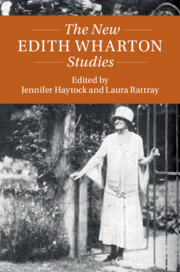Book contents
- The New Edith Wharton Studies
- Twenty-First-Century Critical Revisions
- The New Edith Wharton Studies
- Copyright page
- Contents
- Notes on Contributors
- Acknowledgments
- Editions and Abbreviations
- Introduction
- Part I Self and Composition
- Part II International Wharton
- Chapter 4 Edith Wharton’s Odyssey
- Chapter 5 Edith Wharton’s French Engagement
- Chapter 6 Edith Wharton and Transnationalism
- Part III Wharton on the Margins
- Part IV Sex and Gender Revisited
- Bibliography
- Index
Chapter 4 - Edith Wharton’s Odyssey
from Part II - International Wharton
Published online by Cambridge University Press: 28 November 2019
- The New Edith Wharton Studies
- Twenty-First-Century Critical Revisions
- The New Edith Wharton Studies
- Copyright page
- Contents
- Notes on Contributors
- Acknowledgments
- Editions and Abbreviations
- Introduction
- Part I Self and Composition
- Part II International Wharton
- Chapter 4 Edith Wharton’s Odyssey
- Chapter 5 Edith Wharton’s French Engagement
- Chapter 6 Edith Wharton and Transnationalism
- Part III Wharton on the Margins
- Part IV Sex and Gender Revisited
- Bibliography
- Index
Summary
This essay addresses the role of Greece in Edith Wharton’s representation of home as a topos of strong human and cultural bonds. While Wharton saw France as the epitome of this ideal, she found in Greece its most symbolic expression, one that she identified in The Odyssey and later developed into a narrative of cultural wandering and triumphant return. The essay examines Homeric-inspired tropes of wandering and return in The House of Mirth (1905) and The Children (1928), as well as non-fictional works, such as Wharton’s diary of the 1888 Vanadis cruise. Using archival resources, including Wharton’s undated poem “Penelope” and her impressions from the 1926 visit to Greece on the steam yacht Osprey, I argue that Wharton conceptualized Greece not only as the ancient cradle of Western civilization but also as a paradigm of cultural recovery and the antidote to modern forms of alienation and drift.
Keywords
- Type
- Chapter
- Information
- The New Edith Wharton Studies , pp. 65 - 79Publisher: Cambridge University PressPrint publication year: 2019

